Please use the following link to download the May 20, 2023 issue of the syəcəb
Category: Tulalip News
Extreme Makeover: Tulalip Edition
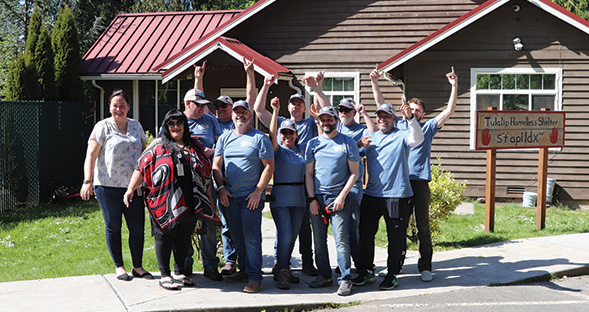
By Kalvin Valdillez, Tulalip News
It was a warm and sunny day on May 11, with temperatures reaching the high 70’s for the first time since last summer. Along Mission Hill Road, between beda?chelh and the Mission Beach Cemetery, a crew of men and women were hard at work at the Village of Hope site. The focus of the day was centered on the original site’s communal building that stood for over two decades and accommodated numerous homeless tribal members and families while they worked to get back on their feet.
Previously known as the homeless shelter, the site took on a new name when the Tribe set plans in 2018 for a revamp that would usher in new opportunities for tribal members looking for a fresh start, by adding seventeen tiny homes to the site. Originally intended to open at a much earlier date, the Tribe held a ground breaking ceremony in October 2021, after meeting many challenges during the height of the global pandemic. And just a year and some change later, the ribbon cutting ceremony for the Village of Hope took place in December 2022, and those seventeen doors were opened for a large portion of Tulalip’s homeless population, just in time for the holiday season.
Teri Nelson, Executive Director of Tribal Services, stated, “Since December until now in May, seventeen cottages are full of singles and families with children. Seven of those residents have gotten full-time employment and two have signed up for college classes. And they’re able to do their classes online in our computer lab, which is set up with five computer stations. Everybody has a different story as to why they ended up where they are. It has a lot to do with the cost of housing. When you’re looking at rentals over $2,000 a month, it’s kind of like well, do I want to eat, or do I want to be house poor?”
Along with the seventeen new homes, the Tribe also added a new community center where the residents can gather to break bread together and join-in on fun activities throughout the week. However, even with the addition of the new community center, the previous communal building still remains a functioning place that people visit for some quality R&R, and to also use the amenities of the building’s kitchen and laundry areas.
Now, when looking at the old site next to the newly established Village of Hope community, it became highly noticeable that the original building needed some updates and repairs. Enter LGI Homes, a national construction company whose slogan is ‘we don’t just build houses, we build homes.’ The community-focused corporation began a company-wide initiative in 2015, known as Service Impact Day, in which they shut down business operations every May 11th to dedicate time and elbow grease to help local communities with their projects for an entire day.
After completing a successful day of manual labor in the springtime heat, Division President of LGI Homes, Ryan Stokes, exclaimed, “This is our favorite day of the year because we get to come out and give back to our communities. We’re the 15th largest home builder across the United States. We founded Service Impact Day in 2015 and we’ve been doing it every year since. We’ve donated over $350,000 and over 450 employee service hours. This was a great project, and we got a lot of work done today. We appreciate the opportunity to come out and serve the community of Tulalip and the Village of Hope.”
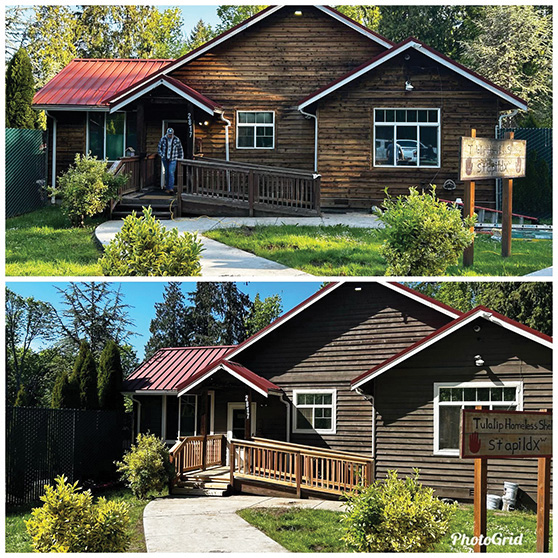
In a side-by-side photo comparison of the building, provided by Teri, it is pleasing to see that the newly refurbished community center kept its signature charm, that originally stood as a sign of hope for the homeless population throughout the years. Only now, the building showcases a rejuvenated shine with a fresh coat of paint and a brand-new deck/wheelchair ramp.
“It felt like Extreme Makeover,” said Teri. “I hung around for a while after they started and I checked in on surveillance every now and then, wondering if they were going to make it before the day ended. And they did! The original deck was dilapidated, there were carpets and plywood laying on top of it to cover up all the holes, so that was our main wish. And they even provided the lumber, which is expensive. And we also wanted painting done, so they painted the front of the building for us – they spruced it up!”
Following a group photo with LGI Homes, in front of the completed project, Teri expressed a desire to replace the ‘Homeless Shelter’ sign next, as they actively move away from that name due to the negative connotations it brings. She explained that there is a new Village of Hope sign that is similar to the current neighborhood welcome signs throughout the reservation, and that it’s just a matter of figuring out a time to install it with Public Works.
“Homelessness is not an identity, it’s an experience,” she passionately stated. “When you are serving families and those children say they live at a homeless shelter – that is not their identity. We are always mindful to say this is your home. We help people who are in a vulnerable state in their lives, and there’s a lot of people out there who are not very friendly to the homeless population. They’re very judgmental and place a lot of blame and shame on them, and that’s not what’s going to help them. They want to feel seen. And since we became the Village of Hope, our residents are really coming together as a community. There’s a lot of community engagement, we have weekly resident dinners, monthly resident meetings, and we are working on creating a resident council that gives them a voice.”
In addition to resident dinners and meetings, the Village of Hope partners with other Tribal departments to bring classes to their community, including a nutrition and cooking class with Snap-Ed. More classes are on the horizon for the residents as the Village of Hope plans on bringing in culture bearers for a drum making class, as well as professionals to teach a homebuyer’s class and a credit building class. Teri stated the plan is to build a robust calendar filled with activities and events for the residents. A portion of those classes will be funded thanks to a monetary donation from LGI Homes, a surprise presented on the day of the remodel.
Said Teri, “It is amazing to have people come with compassion and good hearts, and who genuinely want to give back. It really aligns with a lot of our values as a tribal community. The Division President is over the entire Pacific Northwest region of four different states, and he picked this project. I think that’s so great, and I just have a lot of gratitude for their staff and team.”
Unofficial Mayor of QCV retires
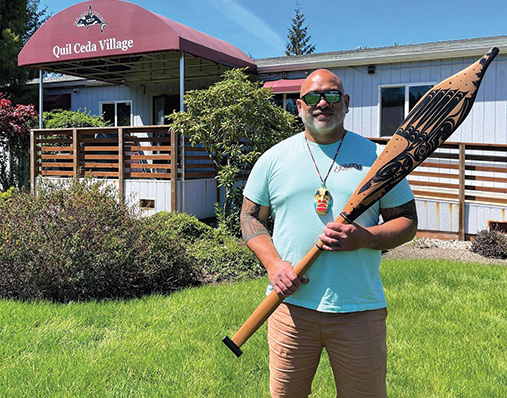
By Micheal Rios, Tulalip News
The longest tenured unofficial mayor in Quil Ceda Village history has retired. After serving his Tulalip community in numerous roles at various tribal entities for 29 years, the last 10 of which were as QCV general manager, Martin Napeahi said farewell to his dedicated staff and elected leaders in an emotional retirement ceremony held on Friday, May 12.
“I’ve been so blessed to empower my employees to feel like an actual team, each having not just a voice that is heard, but also being equipped with the tools to provide all the services QCV offers to our people. Because at the end of the day, all of this is for our people,” said Martin while giving his farewell speech.
In 2001, the Bureau of Indian Affairs approved QCV’s status as a tribal municipality. Quil Ceda Village became the first tribal political subdivision in the nation established under the Indian Tribal Governmental Tax Status Act of 1982, and one of only two federal municipalities in the country. The other being Washington, D.C. As the first tribal city of its kind, Quil Ceda Village is an innovative model of tribal economic development.
QCV is widely regarded as an economic powerhouse, located entirely on federal land held in trust by the United States for the benefit of the Tulalip Tribes. The Village contains the Tulalip Resort Casino, Tulalip Bingo, Walmart, Home Depot, Cabela’s, the 110 designer store Seattle Premium Outlets, and provides jobs to over 5,000 employees.
During his decade-long reign as QCV general manager, Martin has helped fulfill the vision of past tribal leaders who sought to create a destination marketplace on the Tulalip Reservation.
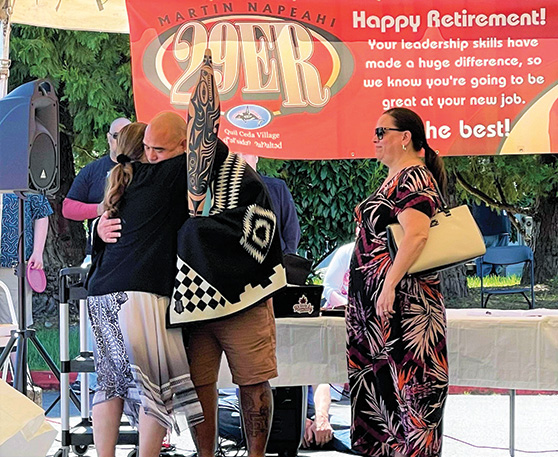
“When I think back to all the business partnerships and significant developments that QCV has helped usher in during my time here, I think of the tax case victory, the Big Water project, and the 116th overpass project. But what I may be most proud of is Remedy,” shared Martin. “From all the behind the scenes stuff that went on just to get approval, to creating the infrastructure and building the Remedy team, to what it became now, which is probably the number one dispensary in Snohomish County. The tax revenue that it’s provided to the benefit of tribal government and QCV is incredible, and something that I can hang my hat on.”
Martin also mentioned this past winter’s stunningly successful ‘Lights & Ice’ event that brought millions of dazzling Christmas lights and an ice-skating rink to the Village as one of his favorite achievements. “To be able to bring our community together with the greater Snohomish County community in that way was amazing. I heard so many joyous stories from families who either got to ice skate for the first time ever or just loved being able to stroll all the light designs with their parents and grandparents,” he explained.
Although the 48-year-old Tulalip citizen is now officially retired from the government life, he won’t be jobless for long. He shared that he’s already accepted a director position with Nakani Native Program. A Native-led nonprofit based in Seattle with the goal to provide programs that are grounded in Indigenous knowledge which brings traditional and western medicine together to transform the way people access healthcare.
“On behalf of Tulalip, I thank Martin for all his hard work and commitment to his tribe and community. He built a team that trusted him, appreciated him, and worked hard to fulfill all the goals he set,” said Chairwoman Teri Gobin. “We wish him the best as he starts this new journey, and want to let him know there’s always room to come back.”
May 13, 2023 syəcəb
Please use the following link to download the May 13, 2023 issue of the syəcəb
Tulalip gathers to recognize and remember lost loved ones on MMIWP National Day of Awareness
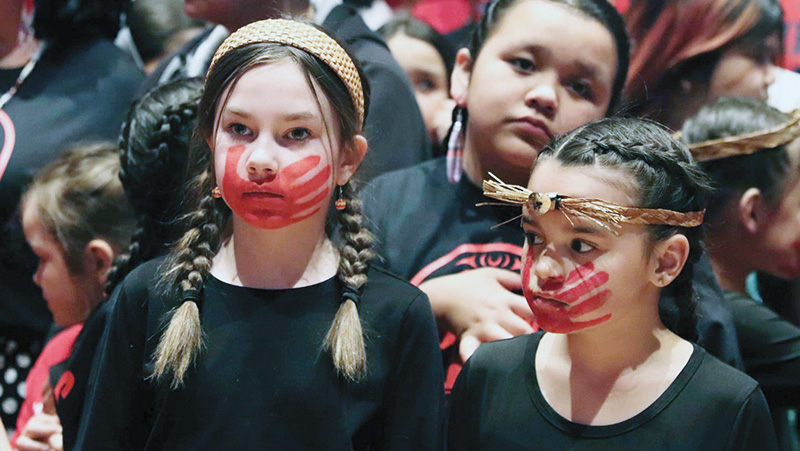
By Kalvin Valdillez, Tulalip News
“When we gather and do this work together, we protect each other,” said Tulalip elder, Don ‘Penoke’ Hatch. “We need to care for each other a little bit more today than we did yesterday. We got to take care of each other, take care of ourselves, take care of our children, and make sure we don’t lose anybody again. I want us all to be more dedicated in how we take care of each other. We are a cultured people and we got to carry it on that way, carry on the love that we have for each other. We don’t want to lose anyone else, because one is one too many.”
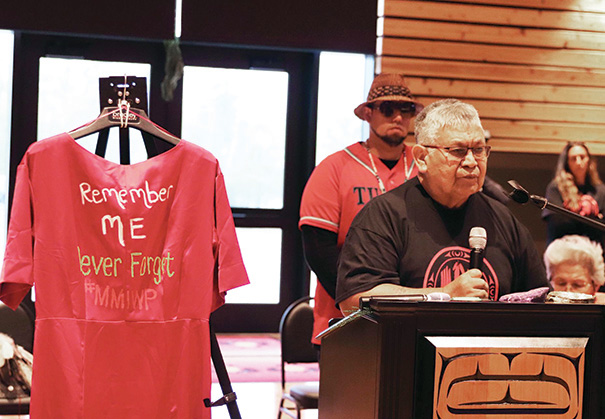
The parking lot of the Tulalip Gathering Hall was packed full on the evening of May 5. So much so, that people were parking along Totem Beach Road and the Tulalip Health Clinic to attend an immensely important gathering. As community members walked into the entrance of the hall, they received a black t-shirt that featured a Native designed logo on the front that read ‘Tulalip MMIWP Healing’. The back of the shirts, in large capitalized red font, displayed the message ‘SAY THEIR NAMES’.
A collaboration between the Tribe, the Tulalip Police Department (TPD), and the Tulalip Education Division, the MMIWP Day of Recognition and Healing event brought together hundreds of Tulalip citizens, as well as a number of Indigenous people from surrounding tribes including Lummi and Lower Elwha. After collecting their t-shirts, each person received a candle and were invited to indulge in a buffet-style dinner while the open remarks and prayers took place.
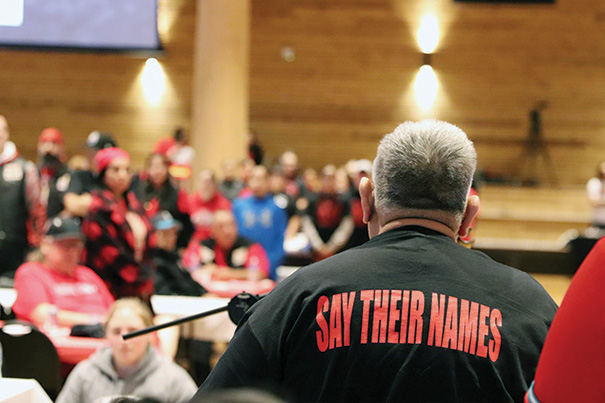
Nationally, May 5 is dedicated to raising awareness about the Missing Indigenous Women and People (MMIW/P) epidemic that continues to spread throughout Native America. Every day, more of our relatives are reported missing, and many of those individuals have yet to be found. Additionally, the rate at which Native people are murdered in the US is higher than any other ethnicity.
Addressing the packed room of the Gathering Hall, TPD Program Manager and local MMIWP Liaison, Anita Matta, shared a few statistics, “Indigenous people make up 17% of missing people in Washington state, but we only are 1.6% of the state’s population. At 84.3%, more than 4 out 5 Indigenous women have experienced violence.”
Overwhelmed by that information, Anita could not hold back tears as she informed the people she could not continue reading the statistics.
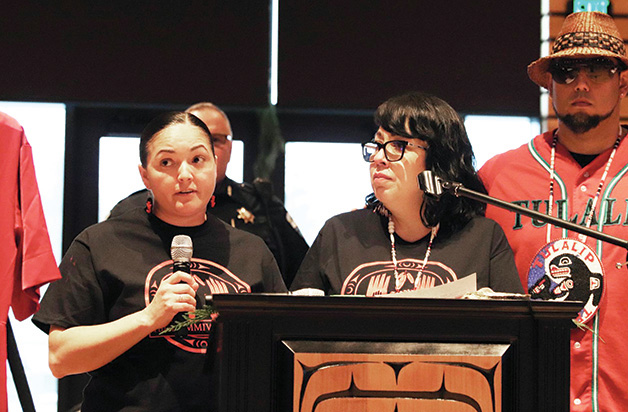
Tulalip Events Manager, Malory Simpson, presented the rest of the statistics while standing by Anita’s side. She said, “55.5% of Indigenous women have been physically abused by their intimate partners. 40% of sex trafficking victims are American Indian/Alaskan Native women. 56.1% of Indigenous women experience sexual violence. 48.8% of Indigenous women have been stalked in their lifetime. Murder is the third leading cause of death for Indigenous women – ten times higher than all other ethnicities. As compared to Caucasian women, Indigenous women are 1.7 times more likely to experience violence, two times more likely to be raped, and have a three times higher murder rate. Out of the reported cases [for MMIW], 4,089 were 0-17 years old, and 1,398 were over 18 years old. There have been 5,487 incidences, and 658 cases are still open from the end of 2022. Washington state has one of the highest numbers of reported cases, with 57 open cases.”
Seven Tulalip tribal members were recognized throughout the gathering including the one open case of Mary Johnson-Davis, as well as individuals who were murdered, and whose family has yet to receive justice, such as Kyle Van Jones Tran and Cecil Lacy Jr. Family photos of each of those tribal members were highlighted in a slideshow that was displayed on five large projector screens and played on a loop throughout the evening.
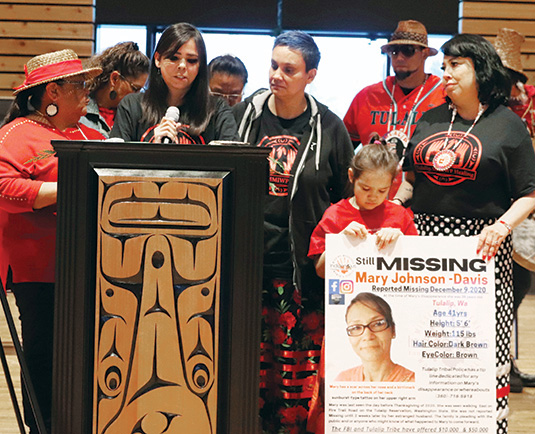
Tribal members Sarah Hart and Monie Ordonia were honored and recognized for their work during the event. Sarah and Monie dedicated their time to raise awareness for the MMIWP epidemic by placing red dresses and shirts in highly visible areas throughout the reservation. Red dresses are used as the national symbol to raise awareness for Missing and Murdered Indigenous Women. Each dress is hung upright to give the illusion that someone is wearing it, but the woman whom it belongs to is missing. Sarah and Monie painted the names of those Tribal members who fell victim to the epidemic on each article of clothing that they hung up.
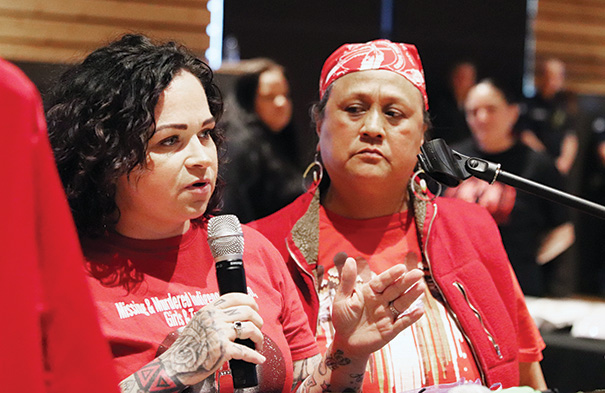
Said Sarah, “It’s been a busy, heavy week hanging up dresses. A few years ago, I knew that I had to do something. I felt there wasn’t enough being done. I had to get the attention of people. I wanted to advocate for our community and for our families. I wanted to educate. Congratulations Tulalip for making the first step in acknowledging our missing women, brothers, sisters, and our girls. Our next step is being proactive – how do we teach our young girls how to protect themselves? We need to put things in motion to protect our women, our girls, and our young boys. There’s a lot of work to be done.”
Monie added, “MMIWP is not to just honor our fallen loved ones, but also to be the protectors of them. If one of my cousins, one of my nieces, or one of my nephews are being abused, am I going to be quiet or am I going to be the strength, the voice for them when they have no voice? You have the power and strength to be the change you want to see in this epidemic of losing our loved ones. The more we make people aware, the more they can’t get away with it. It takes one person to make a difference.”
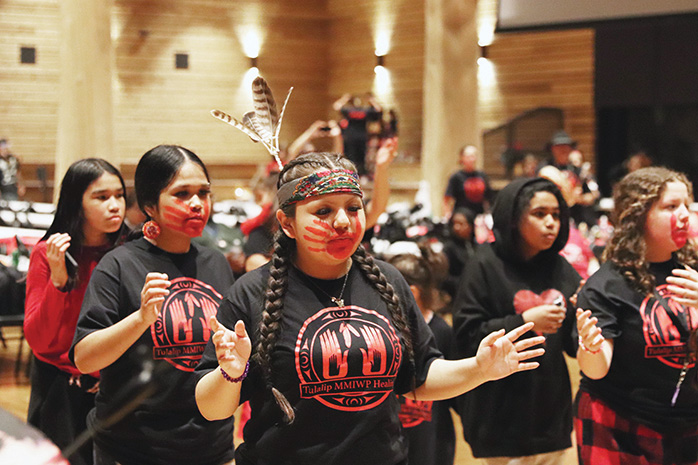
To follow up those powerful messages, Sarah and Monie conjured up another powerful moment by inviting all the ladies in attendance up to the floor. After forming a circle at the center of the Gathering Hall, they sang the Women’s Warrior song and on the last verse, they all put a fist in the air to honor those lives lost and those who are missing.
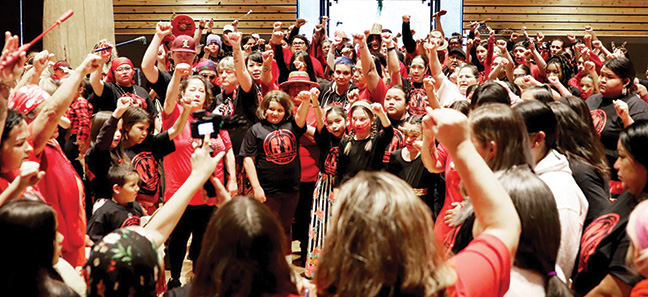
If you follow Tulalip News on Facebook, you may have recently noticed that as soon as person is reported missing from Tulalip, a detailed flyer with that person’s picture, age, height, weight and their last known location is immediately posted. That quick response has helped locate several people over the past few months. And the reason for this expediate release of information is thanks to a Tribal Community Response plan, in which Tulalip is the first tribe in the state of Washington to implement into their community.
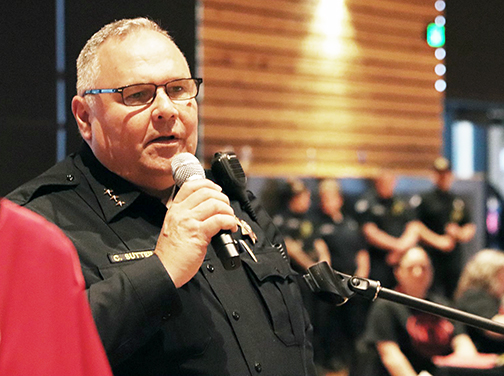
TPD Chief of Police, Chris Sutter, explained, “The purpose of that plan is to bring together, in our coordinated way, all the resources to help families through victim services. To get the word out timely through media, to use community resources effectively, and also to coordinate with law enforcement. We’re proud to work with our US Attorney’s Office on this important mission of bringing our loved ones and missing and murdered people home. We also want to recognize the FBI, and our partnership in working closely with investigators, analysts, victim services and advocates, we’re in this all together. We work very closely with the Attorney General’s office in Washington State to coordinate our efforts, we’re on a taskforce with them. We want to emphasize that we’re working really hard to try to bring justice and to bring in our current open case, Mary Davis-Johnson, home to her loved ones. We won’t give up until that job is done, until that mission’s complete. Through the coordinated Tribal Community Response plan, when we do have a missing person, I want you to know that we take it very seriously. We activate our team very quickly and we have been highly successful in getting the word out and locating people very quickly.”
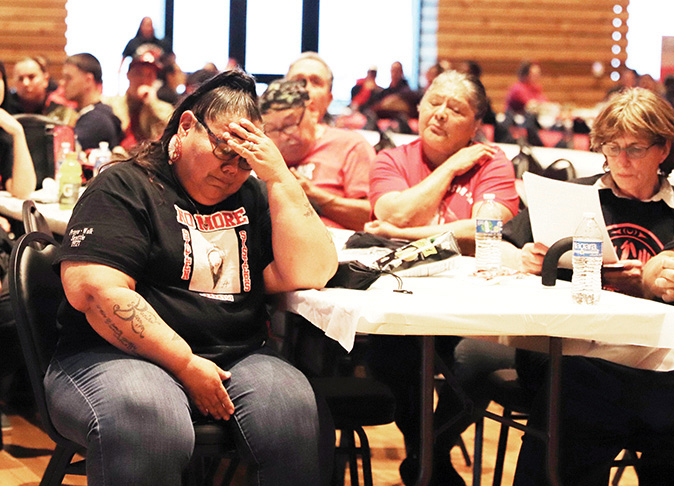
Families of those missing or murdered bravely paid tribute by sharing their loved one’s stories and recounting happy memories spent together. The tears were flowing as the people listened and shared the pain, grief, anger, and heartbreak with the families.
Gerry Davis, sister of missing Tribal member Mary Davis-Johnson, shared, “We want to send love to the families of Sophia Solomon, Jessica Jones, Cecil Lacy Jr., Kyle Van Jones Tran, and Bridgette Simpson. You are all our family. We know all of your pain. We accept you as our family because we are going through the same thing. Some may be murdered, but there’s a lot of people missing, and our sister is one who is missing. Our hearts go out to all of you. And I wish that everybody out there gets peace. We love you all.”
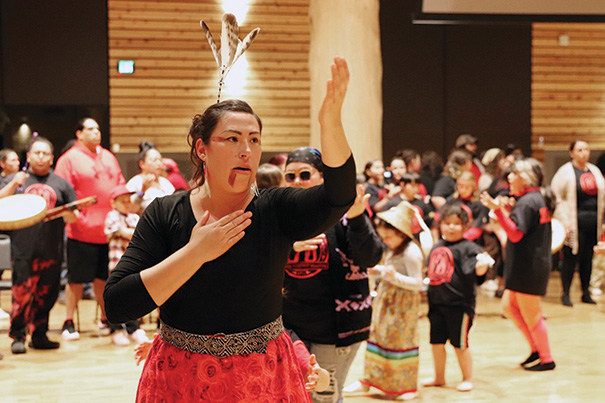
Through tears and sorrow, Nona Davis also shared, “I’m Mary’s older sister, we thank you all for coming out here and being with us. It will be three years in November since our sister’s been gone. I love seeing all the pictures of Mary, you can see how much she loved her family and loved life. If you have any information at all, please call it in. Our family is hurting really bad.”
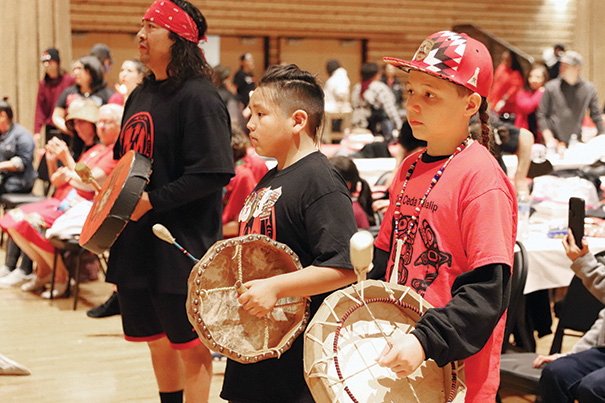
After each family and a number of guest speakers shared a few words, the tables placed at the center of the Gathering Hall were removed. The people created a big circle and were asked to light their candles. As they raised their candles in the air and shared silent prayers, the sound of drums reverberated through the hall as the West Shore Canoe Family led the people in a song dedicated to all the Missing and Murdered Indigenous Women. The song is composed by Antone George (Lummi) and contains the lyrics:
Every night and every day I pray, pray for you, I love and miss you. Sister, come home
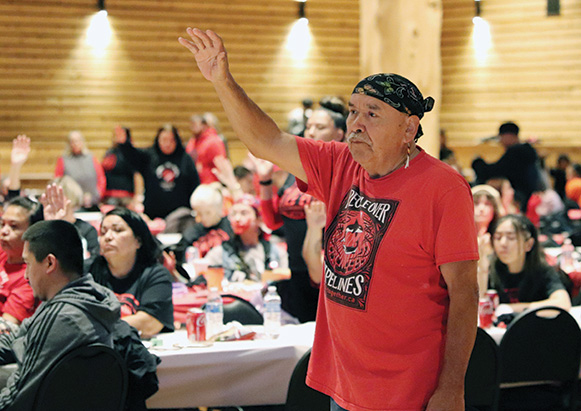
The night ended with a coastal jam as the sduhubš people engaged in song and dance and utilized the medicine of their culture to uplift the people and start the healing process after a heavy night of raw emotion.
TPD has a dedicated tip line for any information on Mary Davis-Johnson’s disappearance or whereabouts. That number is (360) 716-5918. The FBI and the Tulalip Tribes have offered a $10,000 and a $50,000 reward for information leading to the arrest and conviction of those responsible for Mary’s disappearance.
Heritage Hawks tee off for inaugural season

By Micheal Rios, Tulalip News
Now, that spring is in full bloom in the Pacific Northwest, there are hordes of reservations being made at local golf courses to capitalize on the warm weather. Most seek a full round of 18, while some prefer the laid-back atmosphere of just the back 9. We’d like to take a moment to advise locals enjoying an afternoon on the links intending to collect birdies or highly sought-after eagles, please be on the lookout for them hawks. Heritage Hawks that is.
This announcement comes as Tulalip Heritage High School is in the midst of its inaugural season for golf. Coached by husband and wife duo JT and Dinesha Kane, the history making team members are Lincoln Pablo, Damon Pablo, Matthew Miranda, Johnathon Rinker, Seattle Sabbas, Hazen Shopbell, Ponciano Guzman, and Tieriana McLean. They are impossible to miss while driving, chipping, and putting on carefully manicured, green golf courses while wearing their custom-made white polos featuring stunning black and red Coast Salish imagery.
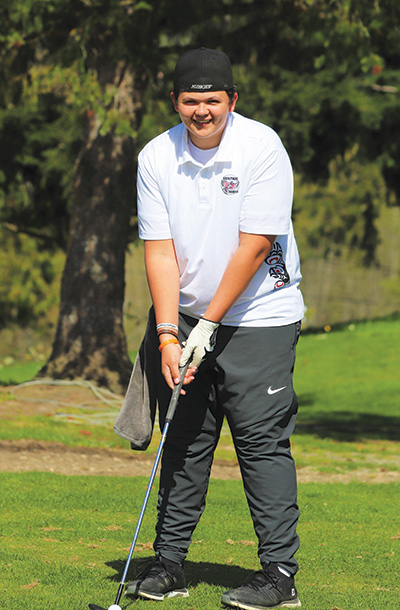
“When we were asked to coach there was no hesitation from my wife or I that we would accept the opportunity to co-coach. We believe our co-coaching model demonstrates to the youth how to work together and gives us the best opportunity to showcase our strengths as coaches,” said coach JT Kane.
“We have been coaching for over ten years starting at Tulalip Battle Creek PGA Jr Academy, Battle Creek Summer Camps, and to the Tulalip Boys and Girls Club Inaugural season last year,” added coach Dinesha Kane. “Our motto is ‘family, team, wins’. The passion of ours to make a difference in youths’ lives is clear, and it’s an honor my husband and I were asked to apply to be coaches. We are excited about our inaugural season and are passionate about the future of the program.”

High school athletics have been known to provide numerous benefits to student-athletes, including improved physical health, leadership skills, and teamwork abilities. While traditional sports such as football, basketball, and baseball have long been popular among high school athletes, golf is becoming increasingly popular. In fact, according to a study by Axios in 2022, boys golf has risen to the eighth most participated high school sport. With a whopping 143,000+ participants playing high school golf nationally.
Golf is a low-impact sport that requires players to walk long distances while carrying or pulling their clubs. This promotes cardiovascular health and helps to build endurance. Additionally, swinging a golf club requires the use of multiple muscle groups, including the arms, shoulders, and core, which can lead to improved strength and flexibility. All that’s to say, golf can do wonders for improving physical conditioning and getting otherwise sedentary teenagers to enjoy outdoor elements.
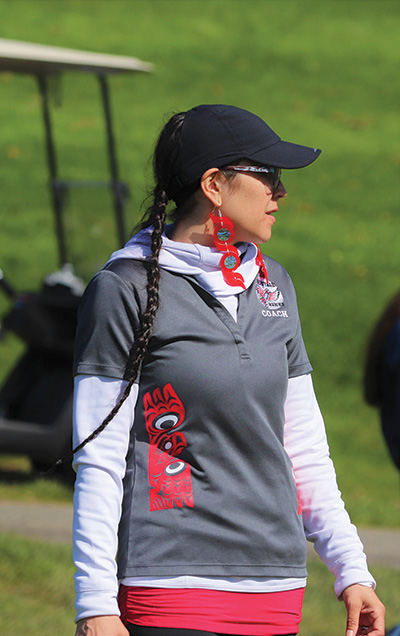
Golf is most commonly thought of as a mentally challenging sport that requires players to stay focused and maintain a positive attitude. The game is often described as “90% mental and 10% physical,” meaning that success on the course is largely determined by a player’s mental state. This mental discipline can carry over into other areas of a student-athlete’s life, such as academics, interpersonal relationships, and even other fields of competition.
“My main sport is basketball. I didn’t even know how to play golf two months ago, so this is all still pretty new to me,” shared 11th grader Tieriana McLean. She carries the mantle as only female golfer on Heritage’s inaugural team. “I’m fortunate that my dad is a really good golfer and has helped me, along with my team coaches, to learn the basics and develop a consistent golf swing. It’s been a struggle at times learning a new sport and I still get frustrated when the ball doesn’t go where I want it to, but being out here on the course, enjoying the weather, and being able to spend more time with my dad, I love it.”

Golf is a sport that can be played and enjoyed for a lifetime. Unlike many other sports, which require a certain level of athleticism and physical ability, golf can be played well into old age. This means that high school athletes who play golf are not just developing skills for the short-term, but are also setting themselves up for a lifetime of physical activity and enjoyment.
For high school athletes who excel at golf, there are numerous scholarship opportunities available at the collegiate level. According to the National Collegiate Athletic Association (NCAA), there are over 1,300 men’s and women’s golf programs across all divisions. This means that there are plenty of opportunities for talented student-athletes to earn scholarships and continue playing the sport at the next level.

“I come from a golfing family. I remember my uncles putting a golf club in my hands at a young age and seeing how much they enjoyed it made me want to be better so I could compete with them. So it would be pretty amazing if I became the first member of my family to earn a college scholarship by playing golf,” said Heritage team captain and 11th grader Lincoln Pablo.
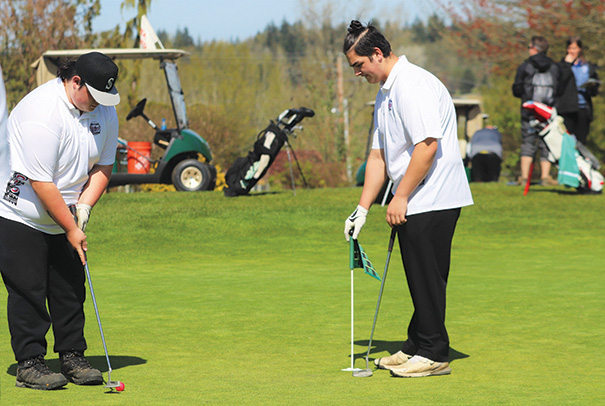
Lincoln was instrumental in developing the Heritage golf program. He recalled participating in the Boys & Girls Club’s golf academy last year and wanting to continue his pursuit of a legendary hole-in-one at Heritage. Unfortunately, Heritage didn’t offer golf as a spring sport, but that only motivated the 17-year-old to lay the foundation for them doing so. He spoke with his athletic director, had meetings with head pros of Battle Creek Golf Course, put budgets together and even developed a team schedule. For his dedication, Lincoln and his peers were rewarded with the creation of a Heritage Hawks golf team.
“It means everything to me to be out here with my cousins and friends, representing our Tribe and proving that we can compete not just in basketball and football, but golf too,” beamed Lincoln with his patented smile before taking a practice putt.
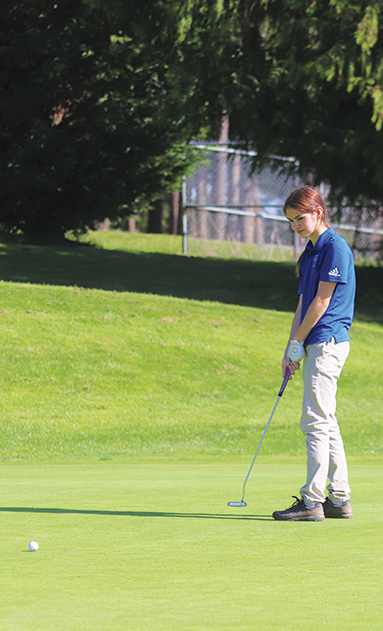
Golf is a sport that is open to athletes of all shapes, sizes, and abilities. Unlike some other sports that require a certain level of physical prowess, golf can be played by anyone who has the desire to learn and improve. This inclusivity can help to foster a sense of community and belonging among student-athletes who may feel left out of other sports. It’s also one the rare sports where the girls can score just as well, if not better, than the boys.
“The boys are more athletic and stronger, so they can of course hit the ball further than me, but I can make up for that with finesse, accuracy and a better putt game,” admitted Tieriana. “At least that’s my mindset. I’m so competitive that I know there’s always a strategy to success and if I get it down then I can achieve my goal of making it to State.”
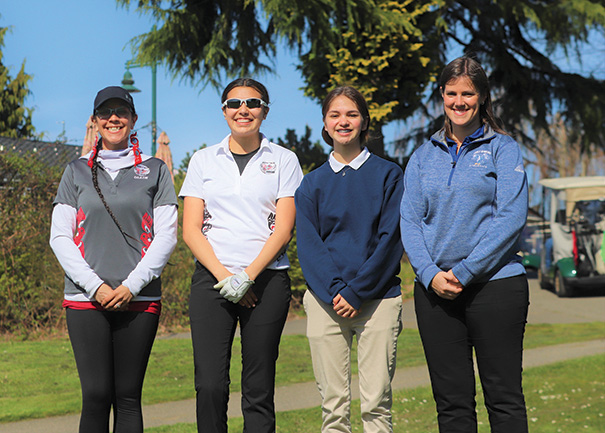
For the Heritage Hawks newest sport participants, playing golf as a high school athlete can provide numerous benefits beyond just the physical ones. The sport can promote mental discipline, personal responsibility, and inclusivity, while also providing opportunities for scholarship and a lifetime of enjoyment. With the popularity of golf on the rise among young athletes, it’s clear that this is a sport that will continue to have a positive impact on high school students for years to come.
May 6, 2023 syəcəb
Please use the following link to download the May 6, 2023 issue of the syəcəb
Waking the canoes
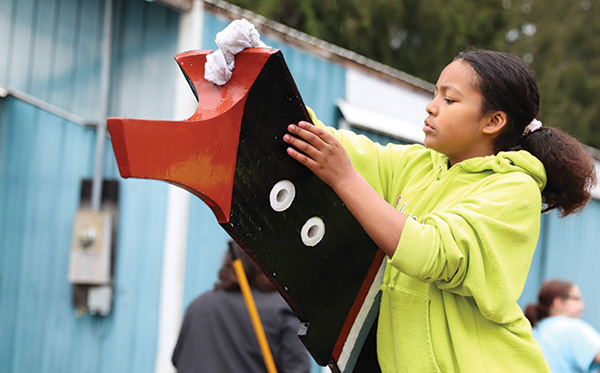
By Kalvin Valdillez
“The canoes have their own spirits because they were living trees at one point,” said Tulalip Skipper, Taylor Henry. “Waking them up is part of that spiritual connection between us and them. It’s literally opening their eyes – because the circles on the canoe head are their eyes.”
One by one, the three Tulalip canoes were carefully hitched to the back of a pickup truck and removed from their designated resting place, at the canoe shed behind the Tulalip Veterans Park, on the evening of May 1. Placed side-by-side at the center of the park, the black and red cedar dugouts were a majestic sight to behold. They radiated with a spiritual energy that was felt by all tribal members in attendance who gathered for the annual canoe cleansing, a special tradition that has been passed through the generations.
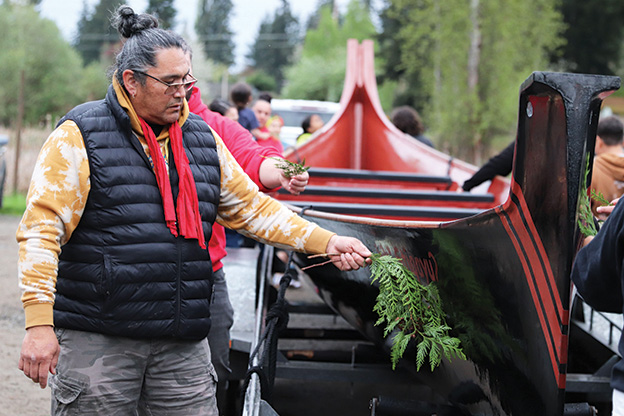
With the coming of springtime and the promise of an eventful summer, which includes Canoe Journey and Spee-Bi-Dah, the canoes were called upon by the sduhubš people to return to their ancestral highways, also known as the Salish Sea, to help the people celebrate and engage in the traditions of the Tribe.
Armed with soapy buckets of water and wash cloths, the people began to gently awaken the spirits of Little Sister, Big Sister, and Big Brother by thoroughly scrubbing every inch of the canoes. Tribal youth accounted for over half of those in attendance at the cleansing. The kids listened to instructions intently and took the task at-hand very seriously as they knew the importance of the work that they were conducting.
Tribal youth, Thomas Wenzel, shared, “I feel like it’s hard work, but not too difficult. I did it with a good heart and embraced that work that we did today. I’m excited because I really enjoy canoe practice.”
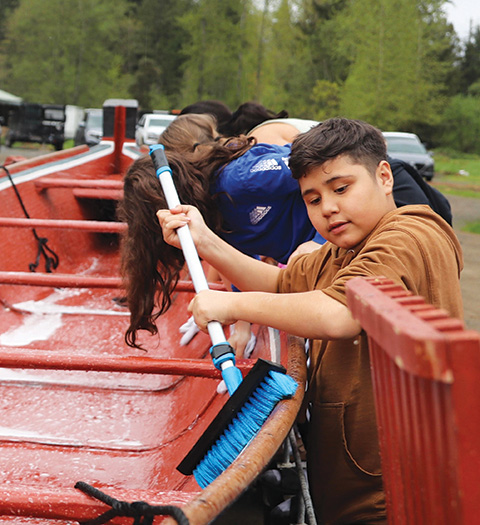
To help build up that canoe puller strength and endurance, the Tribe plans on holding canoe practice once a week until the start of the 2023 Canoe Journey: Paddle to Muckleshoot. For this reason, it’s important that the canoes are awakened in traditional fashion prior to the start of the weekly practices across Tulalip Bay. Canoe practice is not only beneficial to the pullers, but to the canoes themselves in order for them to get reacquainted with the waters and long voyages through unpredictable conditions.
Said Taylor, “Waking them up, it’s like lifting their spirits up, it helps us go smoother on the water. When we take care of them, they take care of us. Today made me feel good, excited to be out on the water, excited to see everybody come together, excited for Canoe Journeys, and to see old friends and families.”
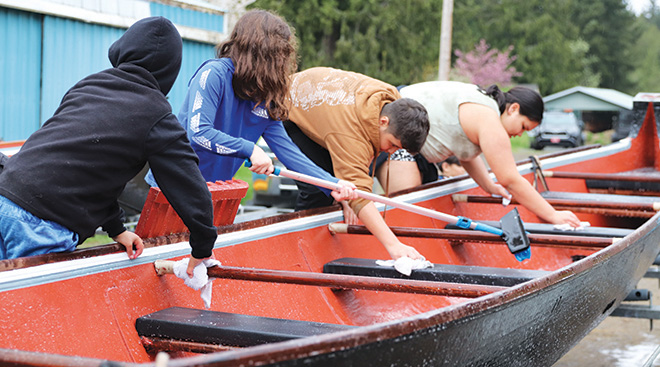
Washing the canoes is only half of the work that takes place at the yearly cleansing event. Once the canoes were restored to their traditional shine, sparkle, and glory, each Tribal member received a cedar branch. Together, the people brushed away any unfavorable energy, emotions, and feelings from the canoes with the medicine of the cedar. The group circled counterclockwise around the canoes four times each, and sang the songs dedicated specifically to Little Sister and Big Sister, and the paddle song to Big Brother.
“We were out here cleaning the canoes and getting them ready for this year’s journey,” stated Tribal member Mike Wenzel. “It’s a cultural connection and something that I like doing. I liked singing and circling the canoes to brush them off and bless them, just keeping the tradition alive.”
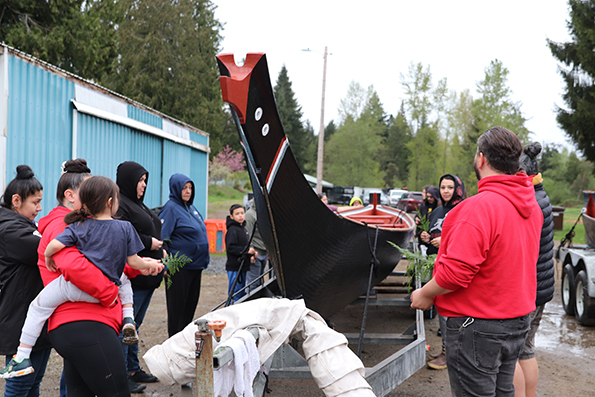
Added Tulalip Skipper, Andrew Gobin, “We brush them off to take anything off of them that may be there from last year, anything that they’re feeling. It feels good to get the canoes washed up and cleaned up, just making sure that they’re in a good place for us as we go out, and they’ll carry us on the water once more and take care of us.”
There are still several weeks before this year’s intertribal Canoe Journey takes place, so if you’re looking to get some reps in, or simply experience the medicine of being out on the water, canoe practice is held at 6:00 p.m. every Wednesday at the Tulalip Marina.
Matika celebrates Project 562 book launch where it all began, with Tulalip high schoolers
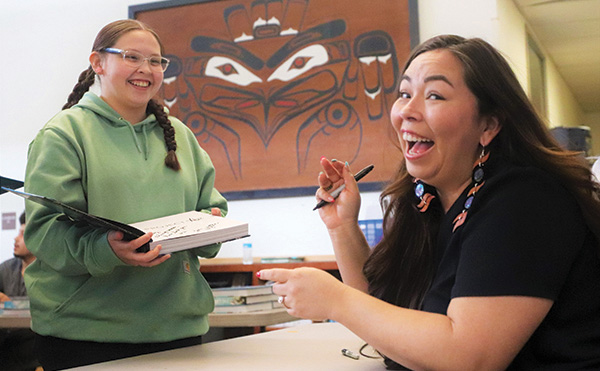
By Micheal Rios, Tulalip News
It’s been over a decade since visual storyteller Matika Wilbur uprooted her life entirely and sold all her material possessions to fully invest in her vision: to photograph the vast beauty and diverse spectrum of Native American culture, unveil the true essence of contemporary Native American issues, and showcase the magnitude of tradition that unites Native America.
She named her vision Project 562. A moniker that reflected the number of federally recognized tribes at the start of her journey back in 2012. There are now 574 federally recognized tribes, yet her intention behind choosing the name Project 562 remains intact as she intended to both inspire and educate.
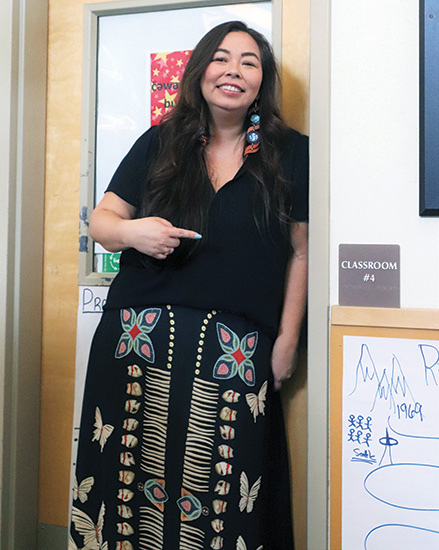
“While teaching at Tulalip Heritage High School and attempting to create a photography curriculum with a narrative that our children deserve, I found an outdated narrative,” she recalled of her journey’s inception. “It’s an incomplete story that perpetuates an American historical amnesia. It’s a story that’s romantic, dire and insatiable…it’s the story of extinction.”
Matika points out the extinction theme often associated with Native America is easily perceived by doing a quick Google Images search. If you search for ‘African American’, ‘Latino American’ or ‘Asian American’, then you will find images of present-day citizens who represent each culture. You’ll also see proud, smiling faces and depictions of happy families.
But if you search for ‘Native American’ the results are very different. You’ll see many black and white photos of centuries old Native Americans who are “leathered and feathered”.
“All of these images and misconceptions contribute to the collective consciousness of the American people, but more importantly it affects us in the ways that we imagine ourselves, in the ways we dream of possibility,” explained the Tulalip citizen turned nationally renowned photographer.
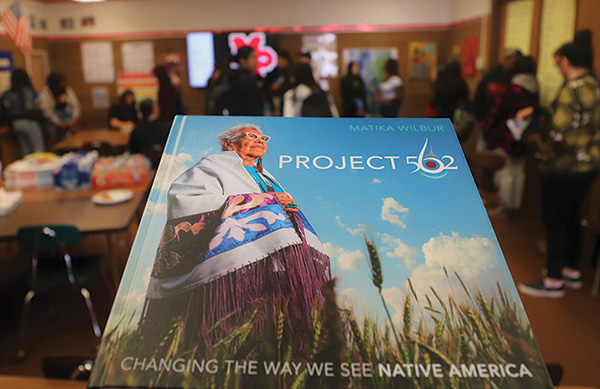
After dedicating the last 11 years, traveling more than 600,000 miles and visiting more than 400 sovereign tribal nations (spanning from the Aleutian Islands of Alaska to the Miccosukee in Florida’s Everglades), Matika has returned home. And with her return came the exciting announcement that she received an exclusive book deal with Ten Speed Press.
While on the road to fulfilling her vision, Matika became one of the Pacific Northwest’s leading photographers and has been exhibited extensively in regional, national, and international venues, such as the Hibulb Cultural Center, Seattle Art Museum, the Burke Museum of Natural History and Culture, The Tacoma Art Museum, the Royal British Columbia Museum of Fine Arts, and the Nantes Museum of Fine Arts in France.
Even more impressively, some of her stunning photos are now included in the Google Images front page when searching ‘Native American’. She’s literally helped change the powerful Google search algorithm to showcase a more modern, vibrantly fierce Native American spirit.
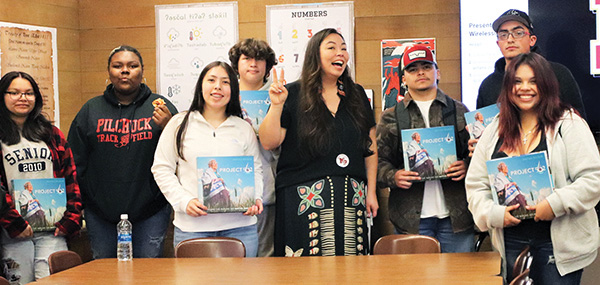
Another momentous experience for her and the local community took place on April 26, when the now 39-year-old Matika presented Native American students of Marysville Getchell, Marysville Pilchuck, and Tulalip Heritage high schools with her crowning achievement – Project 562: Changing The Way We See Native America – a whopping 416-page hardcover book showcasing Native American culture through breathtaking photos and stories from hundreds of tribal nations.
“I set off on this journey to change the way we see Native America. To put together a body of work that represents who we truly are. This journey has taken me across all 50 states, from the Arctic to New Zealand to Puerto Rico to over 1,000 tribal communities in between,” shared the expressive homegrown icon to the Heritage high school students. “All of you are why I did this. Even if I don’t know you personally or you may not know me, it’s so important that you, the children of this community, know how truly loved you are. You are our hopes and our dreams and our future.
“I want you to know that despite what anybody tells you, despite the lies you’ve been told about yourselves, and despite the false narratives written about your ancestors, you deserve all the goodness. You deserve all the medicine. You deserve the opportunity to believe in yourselves. I want you to know that these pages were written for you. Even if you don’t read it immediately or just a little at a time, never forget this book and all its messages within were made for you.
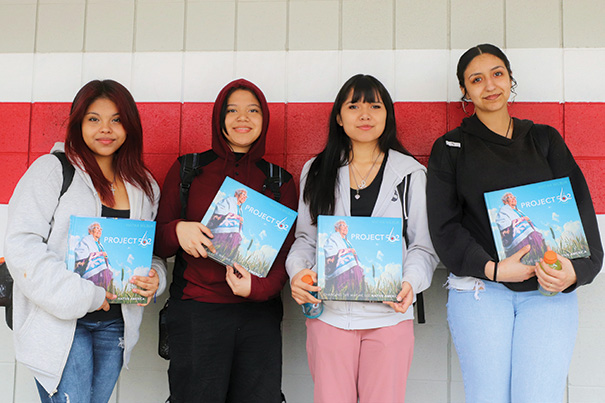
“For me, in this moment, I feel like my dream came true, but I also can’t help but think of all the relatives who didn’t get to see their dreams come true,” she continued. “Hopefully, you too can live to a time where you can see your dreams actualized. If I can leave you all with one final message it’s to dream bigger, imagine bigger…because you deserve it.”
Within her book, which currently ranks #2 on the Amazon Best Sellers list for Art & Photography, are candid conversations about tribal sovereignty, self-determination, holistic wellness, historical trauma, decolonization, rematriation and many more on the importance of revitalizing culture. This creative, consciousness-shifting work is available for purchase locally at the Hibulb Cultural Center and the Elliot Bay Book Company, or through digital purchase via Amazon or Barnes & Noble.
“This book means so much to me because I didn’t even know of her or her journey until the beginning of this year, but I’ve learned through her stories and presentation how much she’s done for our community and many other tribal communities across the country,” shared 9th grader Lilly Jefferson. “I’m so amazed looking at her photos and can’t believe she fulfilled her dream even though no one believed in her in the beginning. I’m really excited for when I grow up and make new dreams because I won’t forget her and what she said. I will dream big!”
“After all her travels and visiting all those other tribes, she still chose to come back home and give back to her community. That’s pretty cool,” added 16-year-old Image Enick. “Listening to her story gives me more inspiration for a dream of mine. I have an idea to create a YouTube channel and document travels to other tribes who play stick games. The game is played different the further you travel, and I’d like to learn how they play in Rocky Boy, Montana and across the border in Canada. Knowing we have a tribal member here who has visited all the tribes, it makes me feel good to think I can approach her with my idea and get tips on who to talk to and where to go when I decide to start my own journey.”
In the most respectful way, Matika estimates she’s been welcomed into a thousand different tribal communities because they not only supported her project whole-heartedly, but also because they too desired to see things change. From media coverage to Google Images search results to what’s written in history books, Native Americans deserve an accurate portrayal of their thriving, dynamic traditions and remarkable oral histories that have sustained Native America since time immemorial.
Art Festival elevates emerging artists

By Micheal Rios, Tulalip News
Creative inclined Native American students of the Marysville School District wandered through a makeshift art gala that was the Don Hatch Youth Center on Thursday, April 20 for the 2023 Art Festival. Accompanied by their families, friends and educators, the emerging artists ranging from 1st to 12th grade wowed Art Festival patrons and judges with a variety of imaginative creations that centered around a shared Tulalip culture and modern day mediums of artistic expression.
“Our annual Art Festival is an opportunity for each Native student within the District to express themselves in a unique and creative way,” explained positive youth development lead advocate, Deyamonta Diaz. “All the work that goes on behind the scenes to make this event possible, it’s like an all-hands-on-deck effort, is so worth it for our community to witness the pride and joy every student puts into their art.
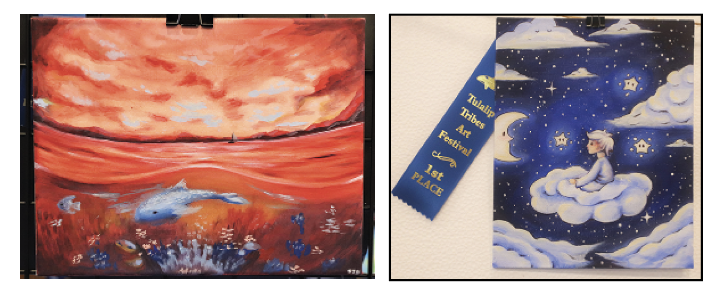
“Each year our expectations are surpassed because we receive hundreds and hundreds of submissions,” he added. “For me, I look forward to seeing what new ways our kids find to express their Native culture or even developing their own way to retell a traditional story. There’s always something new and eye-catching that they come up with. That’s pretty cool.”
For more than two decades now, Marysville School District has partnered with the Tulalip Tribes to dedicate an evening to the art scene embraced by so many emerging Tulalip artists and other Native students within the District. The Art Festival gives fledgling creatives an opportunity to show off their awe-inspiring talents to the community, while also getting a chance to take home a coveted 1st, 2nd or 3rd place ribbon. Plus, all the bragging rights that come with.
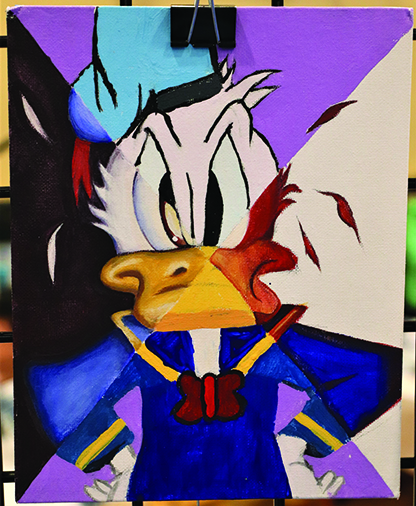
Such was the case with 11-year-old Braiden Kane. He radiated pure joy while leading cousins and classmates to his multiple 3rd place winning submissions. Young Braiden collected three white ribbons for his hand-made cedar headband, seat turtle painting and an alligator habitat structure.
“This was my first time ever creating a cedar headband. My mom took us to culture night and we learned how to make it. Working with cedar felt great and made me feel calm. The sea turtle painting is covered in swirls. The swirl represents my family’s favorite colors,” shared the very happy 5th grader.
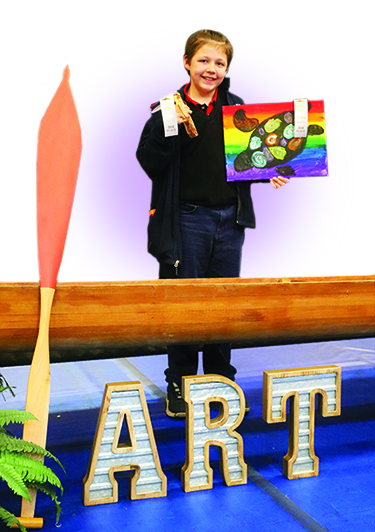
Braiden and his fellow student culture bearers were able to win 1st, 2nd or 3rd place, plus honorable mention, in a variety of artistic mediums. Categories included culture, drawing, painting, writing, mixed media, sculpture, digital art, and pure heart. The top four from each grade and category received a ceremonial ribbon recognizing their talents and a monetary prize.
“It was amazing to see just how talented our Native students are. The new ideas and concepts they come up with every year continue to surprise us judges,” shared Art Festival judge Doug Salinas while admiring the middle school painting section. “I think every kid has the capability to be an artist because their imagination has no limits.”
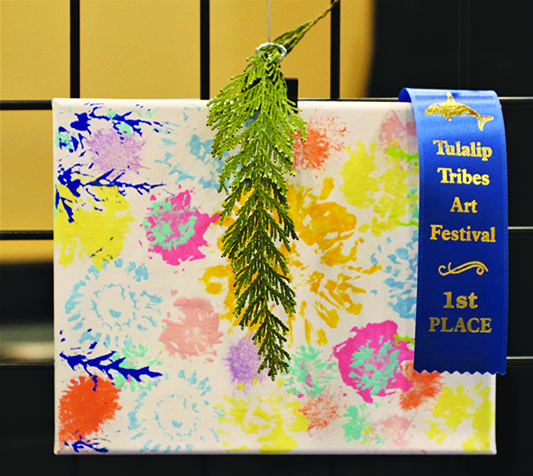
This year’s Art Festival received about 600 submissions, with the most popular category by far being painting. There were many young artists who showed off their diverse talents by submitting artwork in as many categories as they could. In her final year of eligibility, twelfth grader Samara Davis continued her dynastic run of 1st place creations by adding several more blue ribbons to here resume. Seventhgrader Cora Jimicum also continued her run of consecutive years collecting top honors in the painting category.
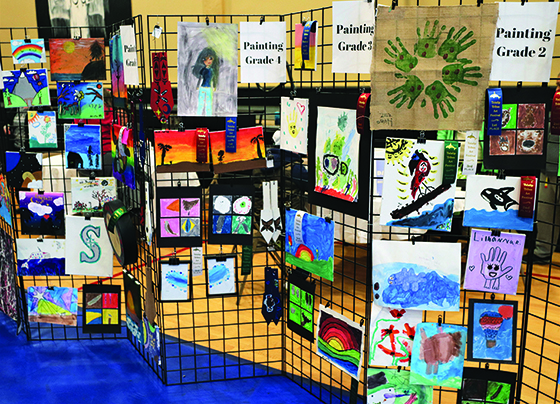
“I like creating art because it’s fun,” said Cora while posing for a picture with her variations of pink paint drip canvas. “Creative writing is my favorite art category because I can create all kinds of characters and have them go through one adventure after another. They can grow and change and just be happy.”
New to this year’s art fest gala was the addition of several interactive tables, each led by an established adult artist. Representing possible career paths for the children to aspire to, or simply to have the young ones recognize art doesn’t have to stop when student life does. Tony Hatch, Dinesha Kane, Ty Juvinel, Melissa Gobin and others did their best to engage Festival visitors and drop knowledge about their creative cultural know-how.
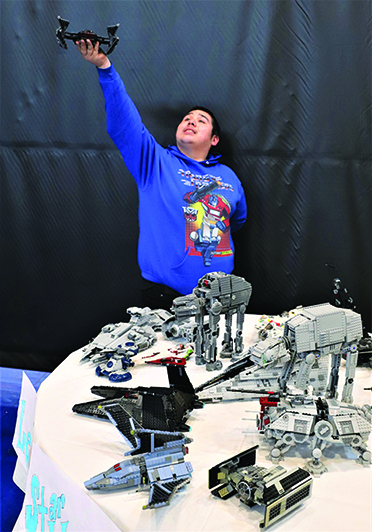
An additional, newly minted adult had his very own table as well. Pure heart icon Sean-Paul Mace displayed his LEGO Star Wars collection. He dazzled with his depths of dark side knowledge and could even tell you which cinematic scenes his figures could be found in.
“He’s been working on this particular collection for about a year,” said Sean-Paul’s mother, Veronica Iukes. “Tracking down each model needed to complete his collection has been quite the endeavor. From finding them online to visiting shops we’ve heard about to reaching out to private collectors, it’s been quite the journey. With his autism, we’ve found that building LEGO figures and other types of hands-on, highly focused needed activities has a calming effect. We love buying Sean-Paul LEGO sets because it’s therapeutic, like a form of medicine that settles him.”
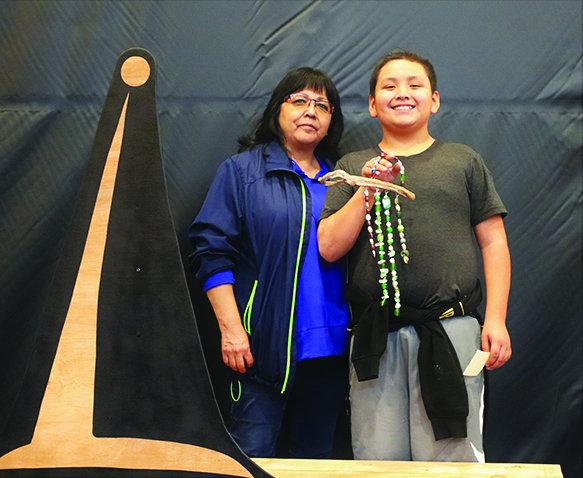
Interwoven through many of the thought-provoking youth creations were both subtle and not so subtle tie-ins to ongoing equality awareness campaigns, human rights issues and demands for social justice. From artistic renditions on the Missing and Murdered Indigenous Women’s crisis, to declarations of the Native-inspired rally cry Water Is Life, to a heartfelt poem by ballin’ with a braid all-star Charlie Contraro invoking the ancestral power of her body-length braid.
My hair connects me to my Ancestors; Like the roots of tree. My braid is the strong trunk; From where I gather my STRENGTH. I am my hair; And my hair is me. – Charlie
Whether it was from reading written words or interpreting the depths of color and images on display from our inspiring adolescent artists, a message being conveyed loud and clear is that yes, in fact, the youngest among us are paying attention to current events and understand how their shared culture is viewed nationally. More importantly, they are capable of channeling their traditional teachings and spiritual strength into pure artistry.
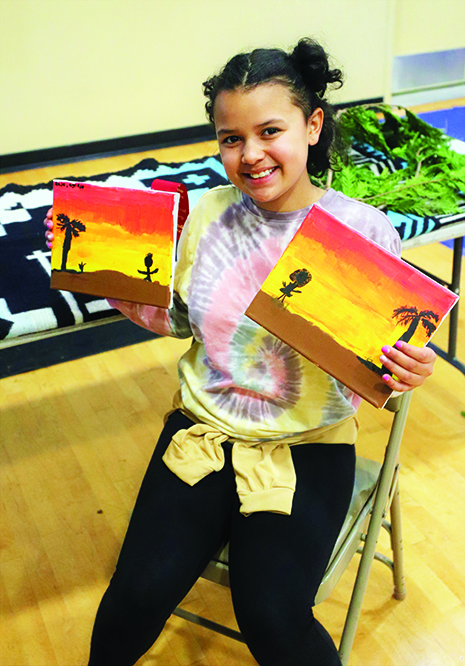
“When our kids create artwork for this event they are able to mix in elements of their personality, culture, family values, and what matters to them as individuals. It’s really incredible to see how even when there are twenty entries of the same type, each is different and unique in its own way because they reflect the artist who created it,” said Courtney Jefferson, Positive Youth Development Manager.
“Witnessing our kids get inspired from cultural pillars like Billy Frank Jr. is nice to see because that means they are learning about these foundational figures in school and retaining the information,” she added. “This proves how powerful it is to educate our people about our shared culture. Especially for the elementary aged children. It’s so important they learn about the legacy of those who came before us and made it possible for us to thrive today.”
Without a doubt, the 2023 Native American Art Festival showcased a wide-range of artistic skills among our Tulalip students. While once again confirming the limitless imagination of authentic Native art created by the next generation of emerging artists.